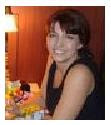I like to listen to lectures from The Teaching Company when I am on long car trips. Listening is not my primary mode of learning; my learning style is more strongly visual and kinesthetic. I do better if I’m in a classroom, seeing the professor, and taking lots of notes. But if I’m in a car for a long time, I can concentrate if the speaker is compelling enough.
Not all of the courses I’ve bought have been spectacularly interesting, but some have, and I haven’t regretted any purchase so far.

What I do regret is that the information and ideas that I am so inspired by while I am listening don’t always stick. The above advertisement is a bit silly, unless you are a much better listener than I am. To really get the benefit of these courses, I need to review the printed outline, listen to the lectures more than once, take notes, do the recommended reading, and further explore anything that strikes my imagination and interest.
On this last trip, to
I’m cautious about (literally and figuratively) buying anything about religion, because it is so common for the author’s particular bias to color the truth of what they are reporting. But religion is one of the primary areas of interest to me, personally and academically. When I look at the list of courses about Christianity, I recognize some professors who have a bias that I strongly disagree with, and other professors whose bias is similar to my own. While I like to hear other people’s points of view, I don’t want to listen to (and pay a lot of money for) hours and hours of someone who is only going to raise my blood pressure. And everybody has a bias.
It is very frustrating to me when anyone characterizes Christianity in a particular way, as if it were a monolithic body of people who hold the same set of beliefs and practices. It is so diverse that I do not even like to call myself a “Christian” unless I can qualify it with a complicated definition. (So don’t ask me about my religion, unless you want to have a three-hour conversation!) I know that Judaism has the same spectrum of diversity, and I wanted a course that would look as broadly as possible at modern Jewish thought.



Previously, my knowledge of Judaism has been very sketchy, even though some people very close to me are Jewish. As a musician, I knew that Moses Mendelssohn (grandfather of Felix) was the most important Jewish philosopher of the eighteenth century, but I have always been curious about his life and the content of his work. As a person who is attracted to existentialism, I was familiar with Martin Buber, and now I have a much enhanced understand of him. And I had not appreciated the impact Spinoza had, particularly on Judaism.
My understanding is much less “sketchy” now. Of course, I am not an expert, and I never will be, but now my mind has a skeletal structure of information, ideas, and understandings about the subject. I plan to listen to these lectures several more times, to strengthen the structure, and I already know some branches that I want to explore further, to build the framework in different directions. If you have ever thought about purchasing a course from The Teaching Company, I highly recommend this one!




No comments:
Post a Comment